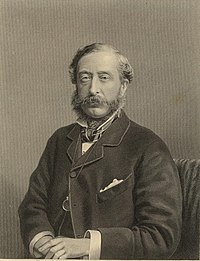Henry Howard Molyneux Herbert
|
The Right Honourable The Earl of Carnarvon PC DL FRS FSA |
|
|---|---|
 |
|
| Secretary of State for the Colonies | |
|
In office 6 July 1866 – 8 March 1867 |
|
| Monarch | Queen Victoria |
| Prime Minister | The Earl of Derby |
| Preceded by | Edward Cardwell |
| Succeeded by | The Duke of Buckingham and Chandos |
|
In office 21 February 1874 – 4 February 1878 |
|
| Monarch | Queen Victoria |
| Prime Minister | Benjamin Disraeli |
| Preceded by | The Earl of Kimberley |
| Succeeded by | Sir Michael Hicks Beach, Bt |
| Lord Lieutenant of Ireland | |
|
In office 27 June 1885 – 28 January 1886 |
|
| Monarch | Queen Victoria |
| Prime Minister | The Marquess of Salisbury |
| Preceded by | The Earl Spencer |
| Succeeded by | The Earl of Aberdeen |
| Personal details | |
| Born |
24 June 1831 Grosvenor Square, London |
| Died |
29 June 1890 (aged 59) Portman Square, London |
| Nationality | British |
| Political party | Conservative |
| Spouse(s) | (1) Lady Evelyn Stanhope (1834–1875) (2) Elizabeth Howard (1856–1929) |
| Alma mater | Christ Church, Oxford |
Henry Howard Molyneux Herbert, 4th Earl of Carnarvon PC DL FRS FSA (24 June 1831 – 29 June 1890), known as Lord Porchester from 1833 to 1849, was a British politician and a leading member of the Conservative Party. He was twice Secretary of State for the Colonies and also served as Lord Lieutenant of Ireland.
Born at Grosvenor Square, London, Carnarvon was the eldest son of Henry Herbert, 3rd Earl of Carnarvon, by his wife Henrietta Anna, daughter of Lord Henry Howard-Molyneux-Howard. The Hon. Auberon Herbert was his younger brother. He was educated at Eton and Christ Church, Oxford. In 1849 he succeeded his father in the earldom. His nickname was "Twitters", apparently on account of his nervous tics and twitchy behaviour.
Carnarvon served under Lord Derby, as Under-Secretary of State for the Colonies from 1858 to 1859. In 1863 he worked on penal reform. Under the influence of Joshua Jebb he saw the gaols ("gaol" being the British official spelling of "jail"), with a population including prisoners before any trial, as numerically more significant than the system of prisons for convicts. He was himself a magistrate, and campaigned for the conditions of confinement to be made less comfortable, with more severe regimes on labour and diet. He also wished to see a national system that was more uniform. In response, he was asked to run a House of Lords committee, which sat from February 1863. It drafted a report, and a Gaol Bill was brought in, during 1864; it was, however, lost amid opposition. The Prisons Act 1866, passed by parliament during 1865, saw Carnarvon's main ideas implemented, though with detailed amendments.
...
Wikipedia
